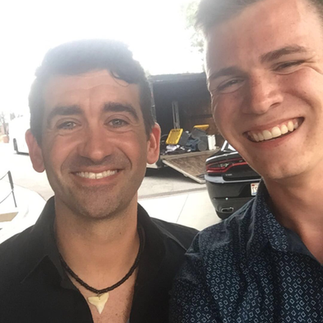Why I Left the Church—And What Brought Me Back
- Michael-Chase Strollo

- Aug 24, 2025
- 10 min read
This is a story I’ve carried for years. These are the years right before the pandemic, the years that shaped my faith in ways I didn’t fully understand at the time. Now, with distance, I feel safe enough to share them.

Childhood Roots
I didn’t grow up with a steady church home. My dad was raised Catholic, but he wasn’t practicing. My mom grew up Baptist, but she rarely went to church. The closest I ever came to a spiritual routine was when my aunt and uncle would take me to Catholic Mass. I can still remember the incense, the silence, the rituals that felt so different from everyday life. But it wasn’t consistent. My parents divorced when I was two, and faith was never something strong that shaped our home. I grew up without a mentor, without someone teaching me right from wrong through the lens of faith and scripture, without the kind of guidance I craved.
In middle school, I got my first real taste of church through a small discipleship group. At the time, it seemed like a chance to connect, but it was inconsistent and more like a way for mom to keep me busy and out of the house on a Wednesday and Friday night. What really shook me was that years later, the leader of that group ended up on the FBI’s most wanted list. That left a mark. If this was supposed to be an example of Christian leadership, what did that say about the rest of it? It was one of the first moments I realized that even in faith spaces, things were not always what they seemed.
Finding a Voice Online
High school was rocky for me. I went through heavy trauma that left me searching for stability. By the time I graduated in 2015, I was 18 and stepping into adulthood with more questions than answers. That was also the year I started building a following online, mostly on Twitter.
I was posting about faith, trying to encourage people, and adding my voice to the bigger conversation. At first, it just felt fun. I didn’t think of myself as an influencer. But then the messages started coming in.
People would DM me saying things like, “best account on Twitter” or “your tweets inspire me every day.” Others shared personal struggles like a cancer diagnosis, a child who had walked away from faith, battles with depression all while asking me to pray for them. Sometimes I would even get handwritten letters in the mail from people who said my words had impacted their lives.
Screenshots of those messages are still saved on my phone, and when I look back at them now, I realize just how much weight I was carrying. I was barely eighteen, figuring myself out, and yet strangers were looking to me for hope. On one hand, it was humbling. On the other, it was overwhelming. I didn’t know myself, let alone how to guide anyone else. It felt like being handed a microphone before I had any foundation to stand on.
That microphone followed me into real life too. Around this same time, I began traveling across Georgia to speak at festivals and to groups like Fellowship of Christian Athletes (FCA) in middle schools and high schools. I would stand in front of people, sharing my story, encouraging them in their faith, trying to give them hope. Some days it felt powerful, like maybe God was using me. Other days, I questioned how genuine I was. Was I really living out what I was preaching, or was I just repeating words that sounded good?
I wanted so badly to be authentic, but the truth is, I was still figuring out who I was. The same pattern followed me everywhere. People were listening to me, but I was still struggling to listen to God. That made the disconnect between what I was preaching publicly and what I was struggling with privately feel even heavier.
Behind the Curtain
In 2016, I joined staff at 104.7 The Fish in Atlanta, one of the strongest Christian radio stations in the commercial industry. I had grown up occasionally listening to it with my aunt, so being part of it felt like everything had come full circle. Now I was behind the microphone, part of the ministry that had shaped my childhood. At first, it was a dream come true.
But even there, I started to feel like an outsider. Some didn’t welcome me in. At times I felt bullied, like I didn’t belong. I thought The Fish would finally give me the sense of community I had longed for, but instead, I often felt left out. And the deeper I got, the more I saw the “industry” side of things: the branding, the competition, the money.
To be fair, I was young and eager, and I probably expected too much. I wanted it to feel like a church when in reality, it was also a business. Still, I struggled to reconcile the two. And now, looking back, I can see just how fragile even the strongest institutions are. The Fish itself was bought out and doesn’t exist in Atlanta anymore. Something that once felt so big, so strong, and so impactful didn’t last forever. That’s the thing about influence and platforms... no matter how powerful they seem in the moment, they aren’t eternal.
The Mega Church Years
By early 2017, I was part of a group of Christian influencers. We were all trying to make something of ourselves online. It was exciting, but it was also messy. There was gossip, comparison, and pressure to look more spiritual than you really were.
When I walked into mega churches during that time, it only reinforced the feeling. Everyone knows the vibe: the lights, the cameras, the fog machines, the skinny jeans, and long T-shirts, (yes, that was the style at the time,) the whole production. For some people, that was inspiring. For me, it felt like a stage I didn’t have the right look for. If you didn’t fit the aesthetic, you weren’t part of the “in” crowd.
What made it harder was that I never had a mentor. Not a pastor, not even a peer a little further along in their faith. Someone who could have pulled me aside, not to shame me, but to guide me. But instead of mentorship, I got gossip. And to be fair, I know I didn’t make it easy sometimes. I wanted attention, I craved validation, and I probably gave people reasons to talk. But it often felt like I was entertainment, like people were waiting for me to crash and burn.
And the gossip wasn’t just whispers. I’ll never forget my birthday one year, when I posted a mirror selfie. Later that same day, a tweet went out mocking people who posted shirtless mirror pics. Everyone told me, “oh, that wasn’t about you.” But when it’s your birthday, when you know what you posted, and when you see the same clique liking and replying, it’s hard not to connect the dots. That was the kind of stuff that ate away at me. Publicly it all looked fun and spiritual, but behind the curtain it was full of cliques, subtweets, and double standards.
Double Standards and Disillusionment
The biggest double standard came in how some treated 'normal people' versus how they treated celebrities. Around that time, Justin Bieber’s connection to Hillsong and Carl Lentz was everywhere. He was out partying with pastors, shots at the bar caught on camera, and yet people praised his “journey.” Meanwhile, if I posted about having drinks on my 21st birthday, I was suddenly the problem. I wasn’t trying to compare myself to him, but the hypocrisy felt like whiplash. Some people got grace. Others didn’t.
Looking back now, it’s almost heartbreaking to realize how much of my generation’s faith culture revolved around worshiping personalities instead of worshiping God. The same people who were quick to criticize me were chasing the approval of celebrity pastors or Christian influencers. And yet, when the scandals came to light, when Carl Lentz and others were exposed, it turned out those leaders were just as flawed and broken as anyone else.
At the time, I didn’t have the perspective I do now. But even then I could sense it: the whole thing felt hollow. We weren’t chasing Jesus. We were chasing people who looked cool on stage. And when you build your faith on personalities instead of God Himself, it’s only a matter of time before it all comes crashing down.
Family and the Walls of the Church
In the middle of all that, something good was happening at home. My mom got engaged to a man who has been an incredible stepdad to me and an amazing husband to her. Both of them had faced so many challenges in their lives, and together they were stronger. I wanted their marriage to be centered in the church.
So I went to my church at the time and asked how marriage ceremonies worked. In my mind, it was simple: churches should celebrate love and welcome families. But what I ran into was something else. My mom and her fiancé weren’t famous. They weren’t donors. They didn’t fit the image. I thought my “in” with influencers and industry ties might mean something, but it didn’t. Looking back, I think the church staff saw me as naïve for even asking, but in the moment I felt crushed.
Industry Over Ministry
In the summer of 2018, I was excited about launching a podcast where I could interview artists about their faith. At a Christian music festival that year, I asked a few artists about coming on. Some were incredibly kind and gracious. Others seemed offended that I even asked. Then festival management pulled me aside and told me I wasn’t allowed to approach artists without prior approval from their managers.
I understood it professionally, but as a young person trying to grow in faith, it stung. That moment made it clear: this world was business first, ministry second.
Weeks later, in August 2018, TikTok acquired Musical.ly and merged the two platforms. Social media was changing right in front of me, evolving into something bigger than it had ever been. Instead of leaning in, I felt so defeated by everything I had seen in the industry that I quit altogether. I walked away from the faith-based side of influence and started chasing a more generic version of my new hobbies: fashion, art, travel, lifestyle.
But in walking away, I also left behind the best part. I stopped sharing the words that had once encouraged people. I stopped responding to the messages from strangers who had told me I was inspiring them, or asking me to pray for them, or thanking me because a late-night tweet had given them hope. I left behind the people who saw something in me I didn’t even see in myself. And most importantly, I left behind God.
Silence and Return
By spring of 2019, I left The Fish. After years of trying to balance being an influencer, working in Christian media, and being part of mega church culture, I was exhausted. I had seen gossip, cliques, favoritism, and a lack of mentorship. But I also know I didn’t always handle it well. I was young, insecure, and often chasing the wrong things like validation, status, and a sense of belonging I thought influence would give me. I wrestled with whether I had ever been genuine, or if I had just been caught up in the machine.
Then 2020 came, and the world shut down. Everything changed. For the first time in years, I had to sit still. There were no festivals, no conferences, no influencer groups, no travel. The noise of it all went quiet, and in that silence I realized what I had been running from. I had left God out.
The truth is, the years between 2020 and 2023 were quiet in another way too. I wasn’t really going to church. I had a Bible on my shelf that gathered dust. Every now and then I would play a worship song, but that was about it. My faith wasn’t gone, but it wasn’t active either. It was something I carried in the background, not something I lived out.
Where I Am Now
Today, my life looks very different. I don’t live in the same city or even the same state anymore. I’ve started going back to church, and for me right now that has meant going to Catholic Mass. In some ways, it feels full circle, because I was confirmed in the Catholic Church when I was in my early teens. Back then, it was my aunt and uncle who took me to Mass, not my parents. I invited my immediate family, but I never really saw them there. And I don’t place blame on them for that. That's just the way life was for us. But being back in Mass now, as an adult, feels different. It feels intentional.
Mass, for me, has become a place of peace. It’s quiet, reflective, steady. Even on Sundays when my mind feels scattered, or when I don’t have the capacity to take in every word being spoken, I can just sit there. The stillness gives me space to reflect, to slow down, and to breathe. Sometimes it’s not about being fully present in every reading or prayer. Sometimes it’s simply about being in the presence of God, even if all I can do is sit quietly.
Maybe that’s something God is bringing back into my story for a reason. Maybe He’s reminding me that my faith was never meant to rest on influencers, or mega church culture, or even my family’s choices. It was always meant to be between me and Him.
And if you’ve ever felt disillusioned or unsure, know this: showing up matters. Even if all you can do right now is sit in the quiet, it still counts. God meets us there.
Note: If you’ve made it this far, thank you for reading. This isn’t a polished testimony or a story with a neat bow tied to the top. It’s just where I’ve been, what I’ve wrestled with, and where I’m trying to go now. I don’t have it all figured out. I still have questions. But if anything in my story connects with you, I hope you know you’re not alone. This song has been an anchor for me in seasons of silence and struggle. I’ll never forget standing backstage at a festival, hearing it performed live, and feeling every word resonate. I’ll leave you with that moment. Maybe it will mean something to you, too.
By: Michael-Chase Strollo
Published: August 24, 2025 6:15 PM ET
United States, Faith, Religion, Lifestyle















































Comments